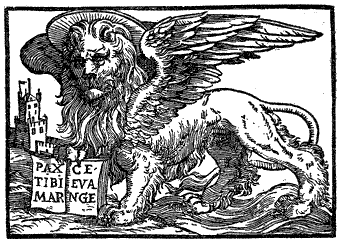|
|
|
|

|
The 2003 edition, however, also has a 'Postface' written by Marie-Thérèse Weal which tells us the history of the garden, of its famous visitors, and what they wrote about it. |
|
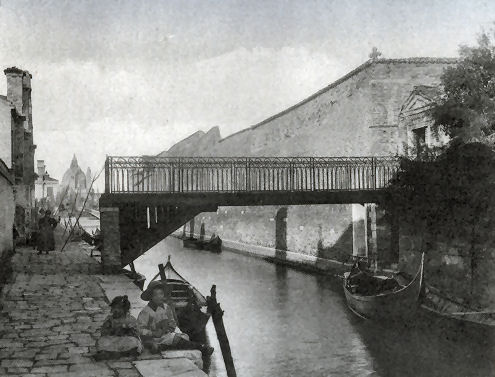 |
|
|
|
The sociable Edens made the garden into the social centre of the
British ex-pat society and attracted visitors like Proust, Rilke,
Sickert
and Henry James in it's turn-of-the-century heyday. Baron Corvo, author of The desire
and pursuit of the whole (and something of a side-thorn for
the ex-pat society of the time)
even offered his services to the Edens as poultry manager during
a period of extreme skintness. Jean Cocteau wrote a poem called
Souvenir d'un soir d'automne au jardin Eaden, after an
argument in the garden between Cocteau's companion and a young American
resulted in the friend shooting
himself on the steps of the Salute. A then not-unusual
occurrence on the Salute steps, by some accounts. In the wake of
Cocteau's visit the garden evidently became a renowned gay
pick-up spot between the wars. |
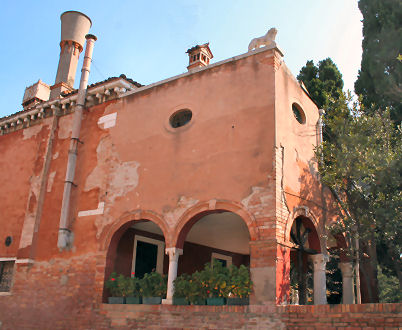 |
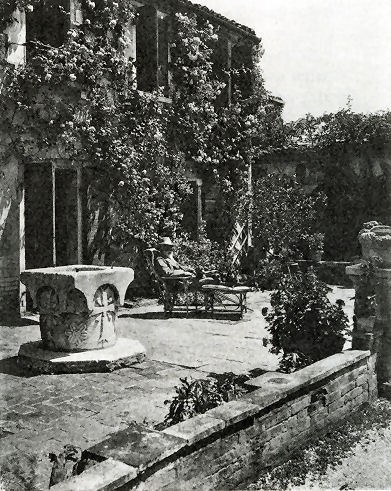 |
|
|
Frederick Eden died in 1916, Caroline lived on until 1928. The garden was bought by Sir James Horlick, founder of the Horlick’s Malted Milk Company, producers of the famed night-time beverage. He had previously created a celebrated - and surviving - garden on the island of Ghia off the west cost of Scotland. He bought The Garden of Eden for Princess Aspasia of Greece and it afterwards passed to her daughter Alexandra, who became the Queen of Yugoslavia when she married Peter II of Yugoslavia in 1944. She became the ex-Queen a year later when Tito established a communist government. They were a somewhat dissolute and feckless couple, by most accounts, not even able to bring up their son (that's the three of them see photo left) who was raised by granny Aspasia. Alexandra later wrote in her memoirs (For a King's Love, published in 1960) of the depredations of the fifty anti-aircraft gunners who occupied the Garden of Eden during the Second World War, but the damage was soon repaired, the rusting anti-aircraft guns and shell cases removed, and new trees were planted. Having been abandoned by the ex- King in the early 1950s she got something of a reputation as a mad woman, and the garden acquired one for being cursed around this time too. Alexandra died in Eastbourne in 1993. Some sources say that she lived in the garden until her death in 1974, but as they get the date of her death wrong we can hardly even rely on this as a date for her leaving it. Also a man called Martin wrote to me in September 2011 saying that he remembers seeing her in Venice around 1978 - "a tall, elegant, lonely figure walking the calle near the Gritti with long dark hair, a shopping bag and a slight limp" and that she was "often to be seen sitting alone on the terrace of the Gritti around midday, waiting, it was said, for someone to buy her a drink. She was a hauntingly sad and romantic figure." |
|
From 1979 until his
death in February 2000 the eccentric Austrian artist and architect Friedensreich
Hundertwasser lived in the garden, having bought it from
Alexandra's son, Alexander, and let it run to romantic ruin. Strangely he claimed until the last that, despite
rumours of his paying more than a
billion (lire?) for it, he never actually
owned the place. Since then the garden has been a locked mystery,
with the name Gruener Janura,
the company that runs Hundertwasser's estate, on the label
on the bell push. A few years ago an article appeared in the gardening magazine Hortus (Autumn 2003) by John Hall, who had actually managed to get inside the garden on a winter afternoon. He reports that, unsurprisingly, of Eden's high-upkeep original structures very little remains. He paints a picture of neglected paved courtyards, dilapidated pergolas and fallen statues that does nothing to lessen the mystery and romance. "One bare and forlorn trellis-pergola ran down the centre, from nowhere to nowhere. Statues remaining on their piers were not properly aligned, others lay on the ground. The old Istrian stone water gate onto the lagoon, with niches and statues on each side, lay broken on the ground." He also came across the graves of Eden's dachshunds and found "where Hundertwasser lived, an open stone conduit leading from his WC inside ended poised over the first of a descending series of stone basins - his personal ecological sewage system". Some recent rumours have it that it had been acquired by both a Japanese Company and a Swiss Corporation, but it seems that it's still owned by 'people' from Vienna and regularly visited by their gardener. The Giardino Edino was classed as a monumento nazionale as far back as 1945 and so let's hope we get to see inside it one day. Until then it lives in ruin in our imaginations. We do now have Google Earth, though, and so in the image below you can see the extent of the place (bottom right) with the gleaming church of the Redentore (top left) included so that you can place it.
|
|
|
|
|
|
Update
December 2009 A correspondent, finding this page, tells me that there had been a radio programme on BBC Radio 3 about the Garden of Eden. The details are here. The programme is called Requiem for a Garden of Eden and is the work of Professor Janet Todd. It begins with some history, description and rhapsodising about Giudecca, and evening strolls leading to the discovery of garden walls. Ms Todd then very effectively and romantically covers the ground, concentrating much on Princess Alexandra and her time as the garden's queen. Update August 2010 In Secret Venice, an excellent odd guidebook, Thomas Jonglez reveals that he has recently been inside the garden. He says that, although not the utter ruin that rumour has it, the garden and house are nonetheless in 'pretty poor shape'. The garden is kept from chaos by gardeners who visit occasionally but do the bare minimum. Update May 2013 No fresh news, but I have just heard from Elisabeth Pols, another Garden of Eden aficionado, who expresses her intrigue and frustration at exclusion in paint. Click on her name to investigate. Update February 2026 After 13 years comes news, and fresh photos. Alex Tur from Canada writes that he's been given access and to some photos. I've added them to the page above, under the Google map view. They show gardens not in ruins and so presumably the fruits of recent restoration, which he reports as currently continuing. 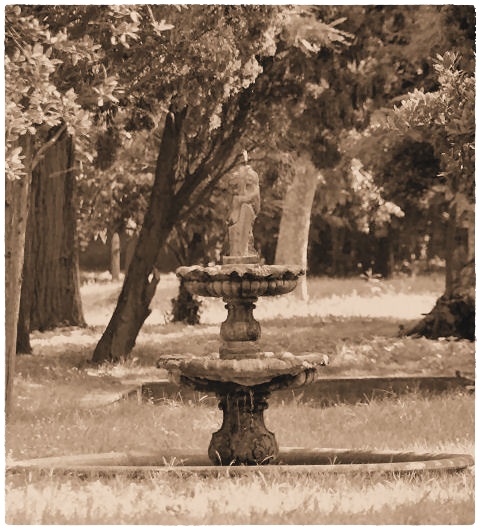 Sources Frederick Eden A Garden in Venice (Frances Lincoln 2003) John Hall The Garden of Eden Article in issue no 67 of the magazine Hortus (Autumn 2003) Lee Bacon Venice Gardens Article from Century magazine (August 1901) Janet Todd Requiem for a Garden of Eden Programme on BBC Radio 3 (27th November 2009) |
